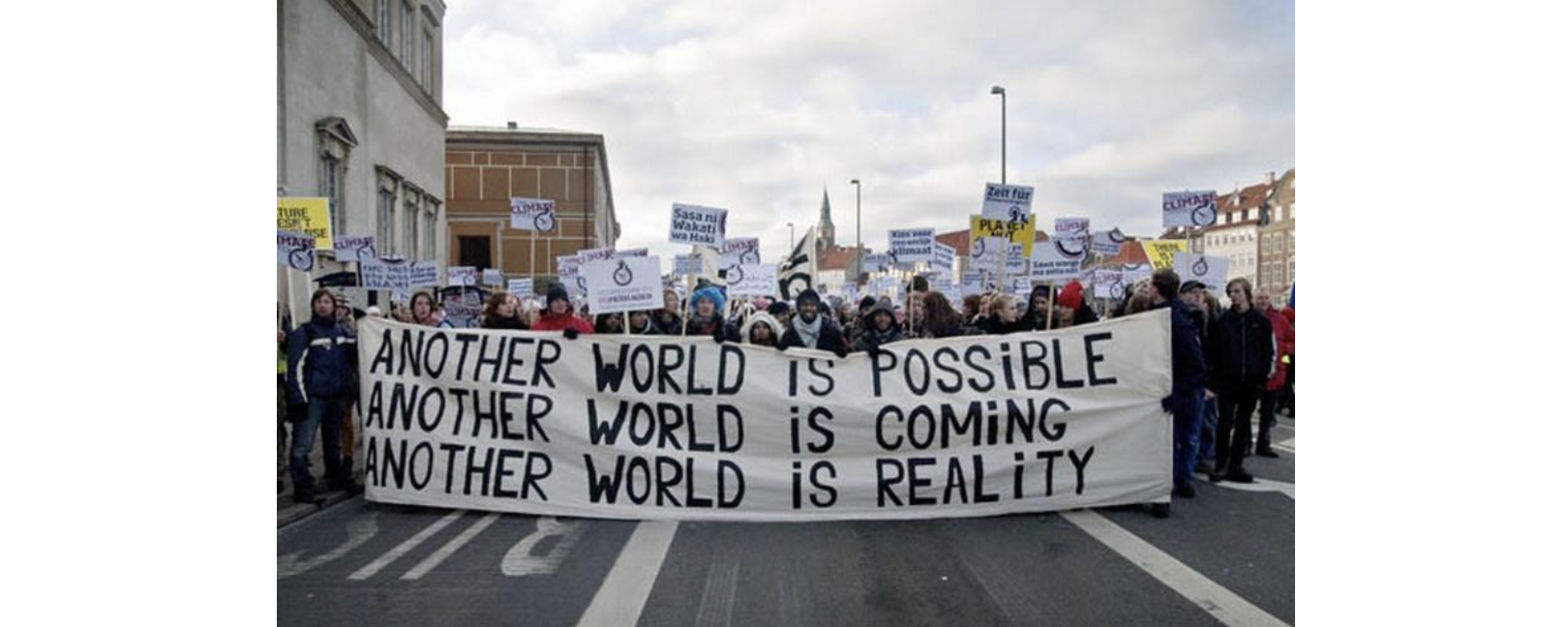note Note générale
Context of the workshop | Commoning Beyond Growth

Ce colloque s'est tenu à l'Université de Notthingham en Angleterre, du 5 au 7 juin 2024. Il a regroupé plus d'une vingtaine de participant·es.
Context
[Traduction libre en français en-dessous]
The threat of ecosystem collapse and the threat of extinction of human life and large parts of non-human life force scholars to explore strategies of response. The commons and a variety of growth critiques are two strands of thought for radical socio-ecological transformation that have become increasingly influential over the last few decades. Both strands of thinking entail the potential to alleviate the existential crises of our times.
The commons can be understood as a social practice of governing material and immaterial resources that do not belong to the state or the market, but to a community of users, the commoners. These commoners create institutions to self-govern resources for the collective benefit through the collective ‘doing in common’, i.e. commoning. Scholarship on the commons emphasises the value of the commons as a potent and desirable alternative to capitalist economies based on extraction and exploitation (Ostrom 1990; Bollier 2003 and 2014; De Angelis 2017).
Growth critiques have also become a focal point in various academic disciplines, and increasingly in social and ecological movements (e.g. Krenak 2023). Growth critiques have operated, since the early 1970s, under a range of terminologies – including degrowth (Georgescu-Roegen 1971; Gorz 1980), prosperity without growth (Jackson, 2017), post-growth (Soper 2020; Jackson 2021), doughnut economics (Raworth), the circular economy (Stahel 2019), and eco-socialism (Foster 2000, Saito 2017). Debates have recently turned from making the case for the urgency of growth critique (Kallis et al. 2020) to discussing strategic pathways to organise a future beyond growth (Soper 2020; Hickel 2021; Schmelzer et al. 2022; Barlow et al. 2022; Göpel 2023). In May 2023, more than 20 European MEPs initiated a four-day conference, recognising on the highest political level the need to think Beyond Growth.
Over the last 2-3 decades literature in both fields (commoning and growth critique) has increased remarkably in size and relevance. Degrowth scholars typically point to commoning as a core value. Hickel (2021), Kallis (2018), and Schmelzer et al. (2022) argue that commoning constitutes a pathway and “central component of a degrowth economy” (Schmelzer et al. 2022, p. 217). Scholarship on commoning has so far largely abstained from explicitly engaging with growth critique. Recently, some scholars have made attempts to build bridges by bringing both concepts into dialogue with each other (Euler & Gauditz 2017; Helfrich & Bollier 2019; Great & Bollier 2020; Spanier et al. 2023; Euler 2019; Wittel & Korczynski 2023). However, a more systematic dialogue has not yet emerged.
It is high time for these bodies of literature but also for these movements to come together to develop a social force, see their shared direction and logic, and thereby increase their potential to initiate a transition to a post-capitalist world. Initiating a convergence of both fields is more than an academic exercise. This workshop will focus strongly on activism and explore pathways to increase their influence in the public sphere.
In the workshop, we will consider a range of questions concerning the relationship between growth critique and commoning, including but not restricted to:
Political philosophy/political economy. What forms of theorising of commoning throw up greater opportunity for an engagement with growth critical theorising? For instance, what are the spaces for symbiosis between commoning and degrowth when commoning is understood through the lens of Ostrom (1990), compared to the spaces when commoning is understood through the lens of De Angelis (2017)? Similarly, what forms of theorising of growth-critique offer an opportunity for a productive dialogue with theorising on commoning?
State regulation. Is the state needed to facilitate a transition toward commoning beyond growth?
Actors. If there are important limitations in what states can do, who will likely be the key actors in a (social) movement of commoning beyond growth? Are there key actors who may be important but whose voice is systematically marginalised - for instance, non-human species? Are the key actors likely to be oriented to the sphere of production, the sphere of consumption, the sphere of identity politics, or another sphere?
The sphere of production. What are the opportunities and tensions regarding the possibility of a movement towards commoning beyond growth within the sphere of production? Concretely, can production beyond growth be organised along principles of commoning?
The sphere of consumption. What are the opportunities and tensions regarding the possibility of a movement towards commoning beyond growth within the sphere of consumption? Are producers or consumers the key parties to drive these movements?
The sphere of identity politics and geopolitics (the Global South). What are the opportunities and tensions regarding the possibility of a commoning beyond growth movement within identity politics and geopolitics?
The public sphere: How can we spread the message? How can we deliver commoning beyond growth with hope?
Keynote speakers: Massimo de Angelis, Kate Soper
The deadline for the submission of a 250-word abstract in the form of a provocation is 15 January 2024. Submit abstracts with a very short bio to andreas.wittel@ntu.ac.uk
Workshop Organisers
- Dr. Andreas Wittel (Nottingham Trent University)
- Fabian Maier (PhD scholar, University of Nottingham)
- Dr. Heather Alberro (Nottingham Trent University)
- Prof. Marek Korczynski (University of Nottingham)
Contexte
La menace d'effondrement des écosystèmes et la menace d'extinction de la vie humaine et de grandes parties de la vie non humaine obligent le monde de la recherche à explorer des stratégies de réponse. Les communs et diverses critiques de la croissance sont deux courants de pensée pour une transformation socio-écologique radicale qui sont devenus de plus en plus influents au cours des dernières décennies. Ces deux courants de pensée présentent le potentiel d'atténuer les crises existentielles de notre époque.
Les communs peuvent être compris comme une pratique sociale de gestion des ressources matérielles et immatérielles qui n'appartiennent ni à l'État ni au marché, mais à une communauté d'utilisateurs, les communs. Ces communs créent des institutions pour s'auto-gérer des ressources pour le bénéfice collectif à travers le « faire en commun », c'est-à-dire la communalisation.
Les recherches sur les communs soulignent la valeur des communs comme une alternative puissante et souhaitable aux économies capitalistes basées sur l'extraction et l'exploitation (Ostrom 1990 ; Bollier 2003 et 2014 ; De Angelis 2017).
Les critiques de la croissance sont également devenues un point focal dans diverses disciplines académiques, et de plus en plus dans les mouvements sociaux et écologiques (par exemple, Krenak 2023). Les critiques de la croissance ont opéré, depuis le début des années 1970, sous une variété de terminologies – y compris la décroissance (Georgescu-Roegen 1971 ; Gorz 1980), la prospérité sans croissance (Jackson, 2017), l'après-croissance (Soper 2020 ; Jackson 2021), l'économie du donut (Raworth), l'économie circulaire (Stahel 2019), et l'éco-socialisme (Foster 2000, Saito 2017). Les débats ont récemment évolué de la démonstration de l'urgence de la critique de la croissance (Kallis et al. 2020) à la discussion des voies stratégiques pour organiser un avenir au-delà de la croissance (Soper 2020 ; Hickel 2021 ; Schmelzer et al. 2022 ; Barlow et al. 2022 ; Göpel 2023).
En mai 2023, plus de 20 députés européens ont lancé une conférence de quatre jours, reconnaissant au plus haut niveau politique la nécessité de penser au-delà de la croissance.
Au cours des deux à trois dernières décennies, la littérature dans les deux domaines (la communalisation et la critique de la croissance) a considérablement augmenté en taille et en pertinence. Les chercheurs en décroissance pointent généralement la communalisation comme une valeur centrale. Hickel (2021), Kallis (2018) et Schmelzer et al. (2022) soutiennent que la communalisation constitue une voie et « un élément central d'une économie de la décroissance » (Schmelzer et al. 2022, p. 217).
Les recherches sur la communalisation se sont jusqu'à présent largement abstenues de s'engager explicitement avec la critique de la croissance. Récemment, certains chercheurs ont tenté de construire des ponts en mettant les deux concepts en dialogue (Euler & Gauditz 2017 ; Helfrich & Bollier 2019 ; Great & Bollier 2020 ; Spanier et al. 2023 ; Euler 2019 ; Wittel & Korczynski 2023). Cependant, un dialogue plus systématique n'a pas encore émergé.
Il est grand temps que ces corpus de littérature mais aussi ces mouvements se rejoignent pour développer une force sociale, voir leur direction et leur logique communes, et ainsi augmenter leur potentiel à initier une transition vers un monde post-capitaliste. Initier une convergence des deux domaines est plus qu'un exercice académique. Cet atelier se concentrera fortement sur l'activisme et explorera les voies pour accroître leur influence dans la sphère publique.
Pistes de réflexion
Lors de l'atelier, nous examinerons une série de questions concernant la relation entre la critique de la croissance et la communalisation, y compris mais sans s'y limiter :
Philosophie politique/économie politique. Quelles formes de théorisation de la communalisation offrent de plus grandes opportunités pour un engagement avec la théorisation critique de la croissance ? Par exemple, quels sont les espaces de symbiose entre la communalisation et la décroissance lorsque la communalisation est comprise à travers le prisme d'Ostrom (1990), comparé aux espaces lorsque la communalisation est comprise à travers le prisme de De Angelis (2017) ? De même, quelles formes de théorisation de la critique de la croissance offrent une opportunité de dialogue productif avec la théorisation de la communalisation ?
Régulation étatique. L'État est-il nécessaire pour faciliter une transition vers la communalisation au-delà de la croissance ?
Acteurs. S'il existe d'importantes limitations dans ce que les États peuvent faire, qui seront probablement les acteurs clés d'un mouvement (social) de communalisation au-delà de la croissance ? Y a-t-il des acteurs clés qui peuvent être importants mais dont la voix est systématiquement marginalisée - par exemple, les espèces non humaines ? Les acteurs clés seront-ils probablement orientés vers la sphère de la production, la sphère de la consommation, la sphère de la politique identitaire, ou une autre sphère ?
La sphère de la production. Quelles sont les opportunités et les tensions concernant la possibilité d'un mouvement vers la communalisation au-delà de la croissance dans la sphère de la production ? Concrètement, la production au-delà de la croissance peut-elle être organisée selon les principes de la communalisation ?
La sphère de la consommation. Quelles sont les opportunités et les tensions concernant la possibilité d'un mouvement vers la communalisation au-delà de la croissance dans la sphère de la consommation ? Les producteurs ou les consommateurs sont-ils les parties clés pour conduire ces mouvements ?
La sphère de la politique identitaire et de la géopolitique (le Sud global). Quelles sont les opportunités et les tensions concernant la possibilité d'un mouvement de communalisation au-delà de la croissance dans la politique identitaire et la géopolitique ?
La sphère publique : Comment pouvons-nous diffuser le message ? Comment pouvons-nous promouvoir la communalisation au-delà de la croissance avec espoir ?
Organisateurs
- Dr. Andreas Wittel (Nottingham Trent University)
- Fabian Maier (PhD scholar, University of Nottingham)
- Dr. Heather Alberro (Nottingham Trent University)
- Prof. Marek Korczynski (University of Nottingham)
Références
- Barlow, Nathan, Livia Regen, Noemie Cadiou, Ekaterina Chertkovskaya, Max Hollweg, Christina Plank, Merle Schulken, and Verena Wolf, eds. Degrowth & Strategy: How to Bring about Social-Ecological Transformation: Mayfly Books, 2022.
- Bollier, David. Silent Theft: The Private Plunder of our Common Wealth. New York: Routledge, 2003.
- Bollier, David. Think Like a Commoner. Gabriola Island: New Society Publishers, 2014.
- Bollier, David and Silke Helfrich. Free, Fair and Alive. the Insurgent Power of the Commons New Society Publishers, 2019.
- De Angelis, Massimo. Omnia Sunt Communia: On the Commons and the Transformation to Postcapitalism. London: Zed Books, 2017.
- Euler, Johannes. "The Commons: A Social Form that Allows for Degrowth and Sustainability." Capitalism Nature Socialism 30, no. 2 (2019): 158–175.
- Euler, Johannes and Leslie Gauditz. "Commons: Self-Organized Provisioning as Social Movements." In Degrowth in Movement(s): Exploring Pathways for Transformation, edited by Burkhart, Corinna Schmelzer, Matthias Treu, Nina, 128-142: Zero Books.
- Foster, John Bellamy. Marx’s Ecology: Materialism and Nature NYU Press, 2000.
- Georgescu-Roegen, Nicholas. The Entropy Law and the Economic Process. Cambridge (MA): Harvard University Press, 1971.
- Gorz, André. Ecology as Politics. London: Pluto Press, 1980.
- Göpel, Maja. Rethinking our World: An invitation to rescue our future. Scribe UK, 2023.
- Grear, Anna and David Bollier, eds. The Great Awakening: New Modes of Life Amidst Capitalist Ruins: punctum books, 2020.
- Hickel, Jason. Less is More: How Degrowth Will Save the World. London: Penguin Books, 2021.
- Jackson, Tim. Post Growth: Life After Capitalism Polity, 2021.
- Jackson, Tim. Prosperity without Growth. Foundations for the Economy of Tomorrow. New York: Routledge, 2017.
- Kallis, Giorgos. Degrowth Agenda Publishing, 2018.
- Kallis, Giorgos, Vasilis Kostakis, Steffen Lange, Barbara Muraca, Susan Paulson, and Matthias Schmelzer. "Research on Degrowth." Annual Review of Environment and Resources 43, (2018): 291-316.
- Krenak, Ailton. Life is Not Useful. Cambridge: Polity, 2023.
- Raworth, Kate. Doughnut Economics Chelsea Green Publishing, 2017.
- Saito, Kohei. Karl Marx’s Ecosocialism: Capital, Nature, and the Unfinished Critique of Political Economy. New York: Monthly Review Press, 2017.
- Schmelzer, Matthias. "The Growth Paradigm: History, Hegemony, and the Contested Making of Economic Growthmanship." Ecological Economics 118, (2015): 262-271.
- Schmelzer, Matthias, Andrea Vetter, and Aaron Vansintjan. The Future of Degrowth Verso, 2022.
- Soper, Kate. Post-Growth Living: For an Alternative Hedonism Verso, 2020.
- Spanier, Julia, Leonie Guerrero Lara, and Giuseppe Feola. "A One-Sided Love Affair? on the Potential for a Coalition between Degrowth and Community-Supported Agriculture in Germany." Agriculture and Human Values (2023).
- Stahel, Walter. The Circular Economy: A User's Guide. London: Routledge, 2019.
- Wittel, Andreas and Marek Korczynski. "After-Progress: Commoning in Degrowth ." The Commoner (2023).
note Note(s) liée(s)
 5 juin 2024
5 juin 2024
Marek Korczynski
5 juin 2024 5 juin 2024
5 juin 2024
Heather Alberro
5 juin 2024 5 juin 2024
5 juin 2024
Fabian Maier
5 juin 2024 5 juin 2024
5 juin 2024
Andreas Wittel
5 juin 2024 12 juin 2024
12 juin 2024
Presentation of the notebook | Commoning beyond growth
12 juin 2024 3 juin 2024
3 juin 2024
Lea Breitsprecher
3 juin 2024 3 juin 2024
3 juin 2024
David Harvie
3 juin 2024 3 juin 2024
3 juin 2024
Nicholas Beuret
3 juin 2024 3 juin 2024
3 juin 2024
Nick Stevenson
3 juin 2024 3 juin 2024
3 juin 2024
Ieva Snikersproge
3 juin 2024 3 juin 2024
3 juin 2024
Janne Säynäjäkangas
3 juin 2024 3 juin 2024
3 juin 2024
Massimo De Angelis
3 juin 2024Carnet(s) relié(s)
 file_copy
29 notes
file_copy
29 notes
Commoning Beyond Growth
file_copy 29 notesAuteur·trice(s) de note
Compte(s) anonymisé(s)
Communauté liée
Commoning Beyond Growth
Localisation
Plus d’informationsPublication
3 juin 2024
Modification
18 juin 2024 10:19
Licence
Attention : une partie ou l’ensemble de ce contenu pourrait ne pas être la propriété de la, du ou des auteur·trices de la note. Au besoin, informez-vous sur les conditions de réutilisation.
Visibilité
public
Pour citer cette note
Anonyme. (2024). Context of the workshop | Commoning Beyond Growth. Praxis (consulté le 1 juillet 2024), https://praxis.encommun.io/n/7BBzMG1eyqybY3sxM_b_z2gOwBY/.
shareCopier